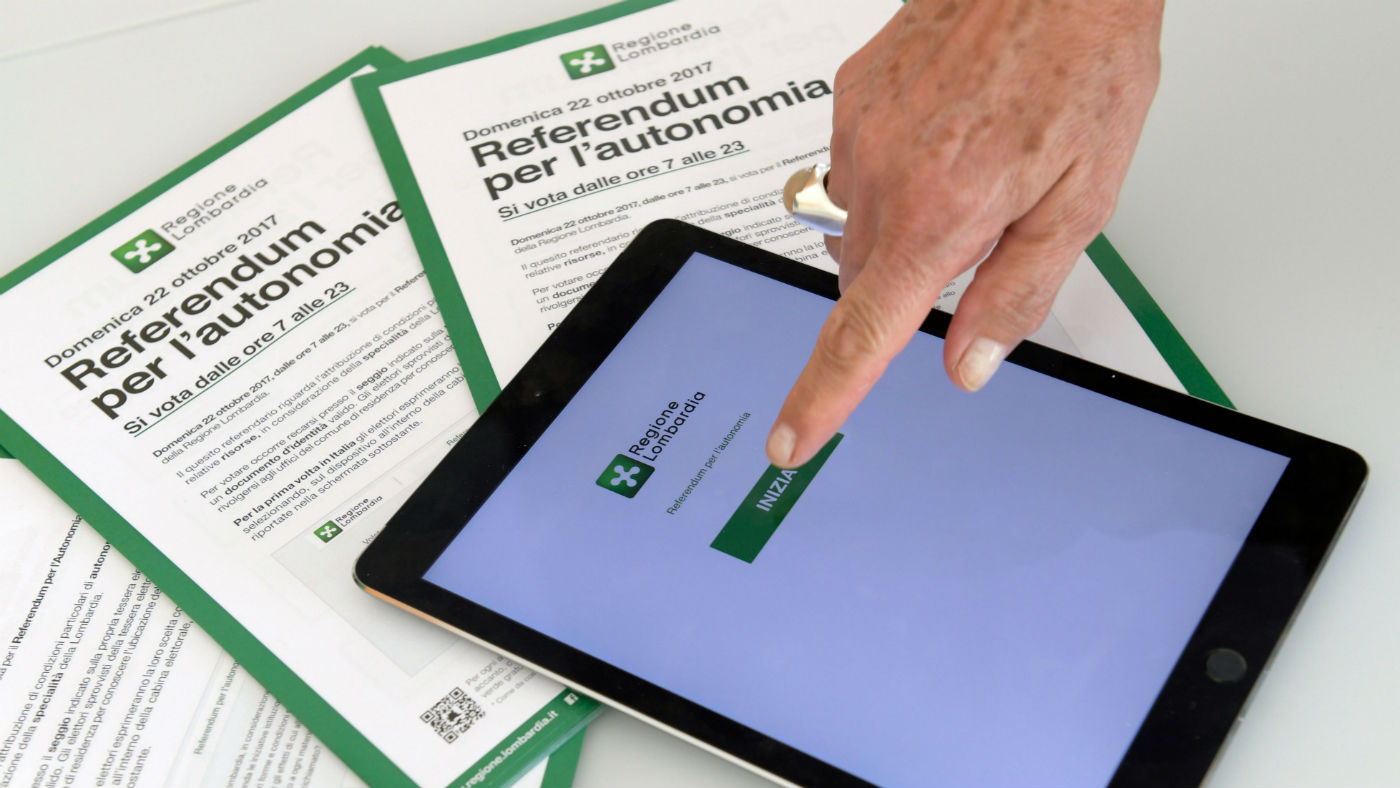Italy’s turn: wealthy regions vote for greater autonomy
Lombardy and Veneto’s presidents say they want ‘fairer’ tax distribution, not full independence

A free daily email with the biggest news stories of the day – and the best features from TheWeek.com
You are now subscribed
Your newsletter sign-up was successful
As the fall-out from Catalonia’s independence referendum continues, two of Italy’s wealthiest regions have voted for more say over how they are governed.
Who is voting for what?
Lombardy, which is home to Italy’s financial capital Milan, and the Veneto region around Venice held votes yesterday aimed at securing more control from Rome. Provisional results from the non-binding referendums suggest 90% of voters backed change.
The Week
Escape your echo chamber. Get the facts behind the news, plus analysis from multiple perspectives.

Sign up for The Week's Free Newsletters
From our morning news briefing to a weekly Good News Newsletter, get the best of The Week delivered directly to your inbox.
From our morning news briefing to a weekly Good News Newsletter, get the best of The Week delivered directly to your inbox.
Together the two regions account for about 30% of Italy’s total wealth. Their governors both belong to the Northern League, which has long argued that the north is subsidising the country’s poorer south.
According to the BBC, Lombardy contributes €54bn more in taxes a year than it receives while Veneto pays about €15.5bn more than it gets back. Both want to halve their contribution.
Although the Northern League once favoured secession, “the votes are aimed at securing further powers over spending, immigration, education and healthcare” and not full independence, says CNN.
Are there similarities with Catalonia?
A free daily email with the biggest news stories of the day – and the best features from TheWeek.com
Lombardy President Roberto Maroni has sought to distance the Italian vote from the situation in Spain, telling Reuters that “we want to remain inside the Italian nation with more autonomy while Catalonia wants to become the 29th state of the European Union. We, no. Not for now.”
Veneto’s President Luca Zaia also dismissed comparisons with the vote in Catalonia as well as the Scottish independence referendum and Brexit vote, telling CNN: “The objectives are radically different. The referendum of Veneto does not question a break in either the supranational right nor with respect to international law, nor with respect to the Italian constitution.”
What has the reaction in Rome been?
While the Italian government has been at pains to take a less hardline approach than the Spanish government, critics in Rome have claimed the polls are a stunt to boost the prospect of the Northern League in next year’s general election. They say the public vote is a waste of millions of euros since all regions have the right to negotiate directly with Rome under the Italian constitution.
What will happen now?
While the process to secure greater regional autonomy is expected to be a long one, “the referendums could have a domino effect in the shorter term” says France 24. A similar autonomy vote is being debated in Liguria, the region that includes the Riviera coastline, and Emilia Romagna, another wealthy industrial part of the country, is already trying to negotiate more devolved powers.
“The issue is likely to spread,” economist Lorenzo Codogno told the French news agency. “Eventually, it will require a generalised approach by the next government and a reform of the constitution.”
Five regions in Italy already boast autonomous powers, including Sardinia, Sicily and Veneto’s neighbour, Friuli-Venezia.
-
 How to Get to Heaven from Belfast: a ‘highly entertaining ride’
How to Get to Heaven from Belfast: a ‘highly entertaining ride’The Week Recommends Mystery-comedy from the creator of Derry Girls should be ‘your new binge-watch’
-
 The 8 best TV shows of the 1960s
The 8 best TV shows of the 1960sThe standout shows of this decade take viewers from outer space to the Wild West
-
 Microdramas are booming
Microdramas are boomingUnder the radar Scroll to watch a whole movie
-
 Epstein files topple law CEO, roil UK government
Epstein files topple law CEO, roil UK governmentSpeed Read Peter Mandelson, Britain’s former ambassador to the US, is caught up in the scandal
-
 Iran and US prepare to meet after skirmishes
Iran and US prepare to meet after skirmishesSpeed Read The incident comes amid heightened tensions in the Middle East
-
 Israel retrieves final hostage’s body from Gaza
Israel retrieves final hostage’s body from GazaSpeed Read The 24-year-old police officer was killed during the initial Hamas attack
-
 China’s Xi targets top general in growing purge
China’s Xi targets top general in growing purgeSpeed Read Zhang Youxia is being investigated over ‘grave violations’ of the law
-
 Panama and Canada are negotiating over a crucial copper mine
Panama and Canada are negotiating over a crucial copper mineIn the Spotlight Panama is set to make a final decision on the mine this summer
-
 Why Greenland’s natural resources are nearly impossible to mine
Why Greenland’s natural resources are nearly impossible to mineThe Explainer The country’s natural landscape makes the task extremely difficult
-
 Iran cuts internet as protests escalate
Iran cuts internet as protests escalateSpeed Reada Government buildings across the country have been set on fire
-
 US nabs ‘shadow’ tanker claimed by Russia
US nabs ‘shadow’ tanker claimed by RussiaSpeed Read The ship was one of two vessels seized by the US military